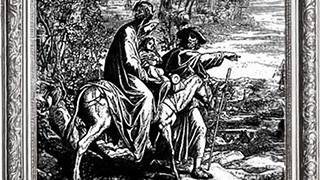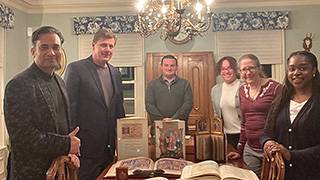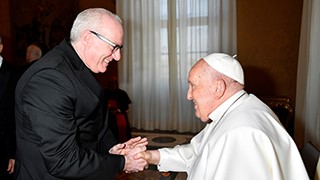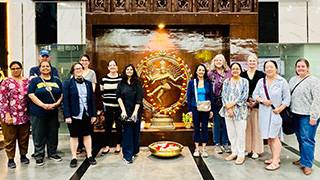Core II Students Study Medieval Interfaith Dialogue - Seton Hall University
Thursday, February 17, 2022
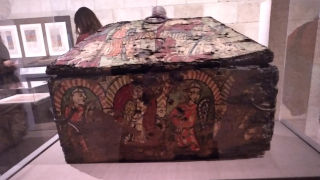
Islamic box.
Inside the Core this week, many students will be reading the works of medieval writers from the Islamic, Jewish, and Christian faiths – specifically, Ibn Rushd, Moses Maimonides, and Thomas Aquinas. They all lived and wrote in the 12th – 13th centuries and were among the medieval religious thinkers to bring in the newly translated works of classical philosophers, particularly Aristotle, to bear on their own respective theologies.
Providentially, this past weekend, the Metropolitan Cloisters Museum offered an exhibit entitled "Frontiers of Faith," exploring artistic connections among Christians, Jews, and Muslims in medieval Spain. It was fascinating to look at the beautiful artistic renderings closely linked to the philosophical and religious writings of these three faiths.
The art in the exhibit illustrated the inter-connections among the faith traditions, how they influenced each other stylistically. For example, a Christian ivory box, decorated with a scene from the New Testament depicting Jesus' multiplication of the loaves and the fishes was capped with a decorative lid some scholars believe was actually Islamic in origin. A medieval Hebrew Bible was on display, beautifully written with decorations, reminiscent of Christian manuscripts from the same period. Spain was home to all three faiths, and while it would be false to pretend that dialogue was the norm, it did occur with more interaction than might be typically expected.
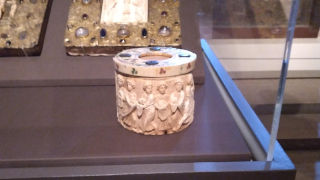
Christian box.
In our texts from Core II, each of the three writers – Rushd, Maimonides and Aquinas -- struggled intellectually with how to integrate texts from a polytheistic culture into their understanding of their respective faiths -- in a way that could actually help them to understand their own faith tradition better. This idea – that respectfully engaging another tradition can actually enhance and enlighten people in their own faith tradition – is at the heart of inter-religious dialogue. The encounter with Aristotle began with Islamic thinkers, who translated his works into Arabic, and then Jewish and Christian thinkers also began to engage with the one called "the Philosopher." They also read each other's works, as scholars know (as the Core textbook's footnotes say) that Aquinas, for example, read the works of Maimonides. Just a few quotes illustrate how these thinkers were looking at similar issues.
For example, Ibn Rushd, the great Islamic thinker, says, "…if someone other than ourselves has already examined the subject, it is clear that we ought to seek help towards our goal from what has been said by such a predecessor on the subject, regardless of whether this other one shares our religion or not" (Christianity and Culture 165). Though he acknowledges that some people might be harmed by approaching such texts lightly or cavalierly, overall, he says "Thus it is wrong to forbid the study of ancient philosophy. Harm from it is accidental, like harm from taking medicine, drinking water, or studying law" (CC 165). To avoid harm from such a pursuit, Rushd says a person studying the books of "the ancients" needs "two qualities, (1) natural intelligence and (2) religious integrity and moral virtue" (CC 166). The great thinker also addressed how faith and reason can work together, a topic that also deeply concerned Jewish and Christian thinkers. Rushd advocates the use of demonstrative reasoning, particularly as outlined by Aristotle, as an effective way of understanding religious truth.
Similarly, Maimonides, in his The Guide for the Perplexed, says, "real wisdom demonstrates by proof those truths which Scripture teaches us by way of tradition" (CC 196). He describes a progression of how faith and reason work together: "we must first learn the truths by tradition, after this we must be taught how to prove them, and then investigate the actions that help to improve man's ways" (CC 197). Maimonides explains that the highest aim of wisdom is the knowledge of the Lord, saying "Both – things that are desirable, and things that thou desirest – cannot be compared to wisdom but ‘in this let him that glorieth glory, that he understand and knoweth me'" (CC 199). This knowledge of the Lord is the highest of the four "perfections" Maimonides explains are possible to human beings, the first three being (1) acquisition of goods, lands, power, and status, (2) physical prowess and beauty of form, and (3) moral perfection, "the highest degree of excellency in man's character" (CC 199). Though this last is important and above the first two, it is not, Maimonides argues, as important as the fourth and highest perfection – (4) "the true perfection of man; the possession of the highest intellectual faculties; the possession of such notions which lead to true metaphysical opinions as regards God" (CC 198). However, this is not mere intellectual knowledge but "knowledge of God" not simply knowledge about God.
Thomas Aquinas also argues for the importance of wisdom, noting in Summa Contra Gentiles,
"Among all human pursuits, the pursuit of wisdom is more perfect, more noble, more
useful, and more full of joy" (CC 142). Like his Islamic and Jewish contemporaries,
Aquinas values demonstrative logical reasoning. He says, "Now, while we are investigating
some given truth, we shall also show what errors are set aside by it; and we shall
likewise show how the truth that we come to know by demonstration is in accord with
the Christian religion" (CC 143). Quoting "the Philosopher" (i.e. Aristotle), Aquinas
says, "it belongs to an educated man to seek such certitude in each thing as the nature
of that thing allows" (CC 144). However, in Summa Contra Gentiles, excerpted in the
Core II textbook, Aquinas shows that human reason can go only so far; though we should
use it as much as our capacity allows; in fact, Aquinas (like Rushd and Maimonides)
argues strongly that there are things about God that cannot be understood by reason.
In fact, he explains that it is good that this is the case as not all people are capable
of that kind of high level reasoning, but all people need to be able to have spiritual
union with God through faith and the work of the Holy Spirit.
Aquinas quotes the early Christian writer Hilary, from his Trinitate, in words that
are applicable to any religious person using reason to study faith:
Enter these truths by believing, press forward, persevere. And though I know that
you will not arrive at an end, yet I will congratulate you in your progress. For,
though he who pursues the infinite with reverence will never finally reach the end,
yet he will always progress by pressing onward. But do not intrude yourself into the
divine secret; do not, presuming to comprehend the sum total of intelligence, plunge
yourself into the mystery of the unending nativity; rather, understand that these
things are incomprehensible. (CC 152).
All three writers would agree that while reason is a powerful and beautiful gift from the Creator that can and should be used in knowing Him, we are still deeply dependent also on both revelation and our own faith-filled response to it. The art, also shared by the three faith traditions, depicted in the exhibit "Frontiers of Faith," hints at the beauty of the mystery that reason alone cannot fully grasp.
Categories: Faith and Service

